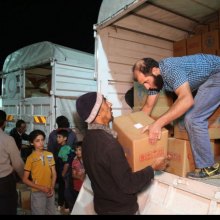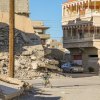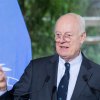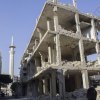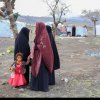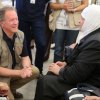
Aid obstacles are ‘matter of life and death’ for besieged Syrians, says senior UN adviser
Aid obstacles are ‘matter of life and death’...
Speaking to journalists in Geneva, UN Special Adviser Jan Egeland said that the agreement was needed to remove what he called an “administrative quagmire” that has prevented all aid from reaching besieged populations by road so far this year.
Ahead of a round of Intra-Syrian negotiations in the Swiss city next week, Mr. Egeland added that the issue is “a question of life and death” for many.
So far this year, aid agencies and their partners have not reached a single besieged area inside Syria by land. There are 13 of these besieged and hard-to-reach areas in all, where well over 600,000 people are increasingly vulnerable, after six years of war.
Mr. Egeland described the lack of aid deliveries as an “enormous disappointment,” before announcing that the Syrian Government had given assurances that requests to deliver food and medical supplies would be met, rather than being blocked at the last moment.
In recent days “men with guns” had jumped onto more than two in three convoys to unload diarrhoea kits for children and maternity kits for pregnant women, Mr. Egeland said.
“This must change and can change,” he continued, adding that there had been intensive diplomatic activity by the UN or UN envoys and with the help of members of the task force with the Government of Syria, who say that a new and better system avoiding the “administrative quagmire where we have to have green lights from so many instances that in the end no convoy moves to any besieged area.”
Nowhere is aid needed more than in the so-called ‘Four Towns’ of Foah, Kafraya, Madaya and Zabadani.
“We hope and believe it will change now; it must change now. Because if we are not reaching the ‘Four Towns’ very soon we will see again the scenes that we saw when the whole thing started a year ago: people starving.”
With UN-facilitated talks in Geneva due to begin next week, Mr. Egeland said it would send “a very important signal” if aid convoys that were standing by were allowed through to Al Waer in Homs governorate, another besieged location.
‘Mixed results’ for Humanitarian Taskforce’s first year
Assessing the work carried out by the Humanitarian Taskforce in the year since its establishment by the International Syria Support Group (ISSG) to boost aid access, he said the results had been mixed.
The ISSG established respective taskforces on humanitarian aid delivery and a wider ceasefire. They have been meeting separately since early this year on a way forward in the crisis. Russia and the United States are the co-chairs of the taskforces and the ISSG, which also comprises the UN, the Arab League, the European Union and 16 other countries.
While noting that the taskforce had nearly trebled the number of people reached in 2016 compared with the previous year, he said progress has been hampered of late.
“The Humanitarian Taskforce could provide access especially through the initiatives of the co-chairs Russia and the United States when they were active and working together, but also other Member States helped us in real time in a number of convoys that were stopped and in the end were helped through checkpoints because of diplomatic initiatives,” he explained.
As such, “it is a shame that members of the task force were not able to lift a single siege by negotiations in 2016. There is commitment to try to do that in 2017, it could happen through talks in Astana, in Geneva and elsewhere. ‘Lift the sieges’ is our appeal. Sieges belong in the Middle Ages, they do not belong in 2017,” said Mr. Egeland.
Looking ahead, Mr Egeland appealed for the taskforce’s co-chairs to do more, along with Member States who have influence on the Syrian Government and armed opposition, such as Iran, Turkey and the Gulf States.
News from the political front
Meanwhile, according to a UN spokesperson, the Special Envoy for Syria, Staffan de Mistura, met in Moscow with Foreign Minister Sergey Lavrov, Defense Minister Sergei Shoigu and Deputy Foreign Minister Gennady Gatilov.
They discussed the ongoing meeting in Astana and how best it can contribute to the preparations for the Geneva round of negotiations scheduled for next week. Meetings were useful and productive. Other issues, such as humanitarian access and UN-Russia cooperation, were also discussed.
The spokesperson confirmed that a five-member UN delegation is in Astana to lend its expertise in discussions on the consolidation of the ceasefire regime and related issues.
http://www.un.org/apps/news/story.asp?NewsID=56187#.WKYXPfLqVTU
 Reload
Reload